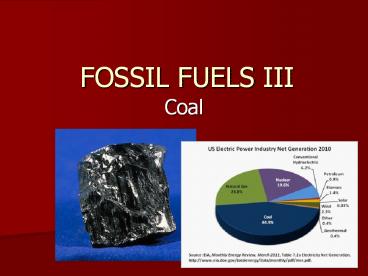FOSSIL FUELS III - PowerPoint PPT Presentation
1 / 21
Title:
FOSSIL FUELS III
Description:
Use may be expanded Replace aging oil/natural gas/nuclear electric plants More demand for electrical energy Alternative uses ... and hydrogen power plant ... fuel ... – PowerPoint PPT presentation
Number of Views:280
Avg rating:3.0/5.0
Title: FOSSIL FUELS III
1
FOSSIL FUELS III
- Coal
2
- Formed from ancient plants.
- Coal beds were prehistoric swamps.
- Can be considered to be stored solar energy.
- Photosynthesis
- CO2 H20 solar energy ? carbohydrates O2
- We run the process backward and burn carbs to
get energy, water and carbon dioxide.
3
Normally, when a plant dies it decomposes. If
there is not enough oxygen, it cant completely
decompose, thus we get a slow accumulation of
energy. In a swamp, the bacteria that decompose
the plants also use up the oxygen. Coal found
today formed between 1 and 440 million years ago.
4
- As geological processes apply pressure to peat
over time, it is transformed successively into - Lignite, also referred to as brown coal, is
the lowest rank of coal and used almost
exclusively as fuel for steam-electric power
generation. Jet is a compact form of lignite that
is sometimes polished and has been used as an
ornamental stone since the Iron Age. (60 75
carbon) - Sub-bituminous coal, whose properties range
from those of lignite to those of bituminous coal
and are used primarily as fuel for steam-electric
power generation. (75 85 carbon) - Bituminous coal, a dense coal, usually
black, sometimes dark brown, often with
well-defined bands of bright and dull material,
used primarily as fuel in steam-electric power
generation, with substantial quantities also used
for heat and power applications in manufacturing
and to make coke. (85 90 carbon) - Anthracite, the highest rank a harder,
glossy, black boto used primarily for residential
and commercial space heating. (gt 91 carbon)
5
Type Carbon Energy Content (Btu/lb)
Lignite 30 5000-7000
Subbituminous 40 8000-10000
Bituminous 50-70 11000-15000
Anthracite 90 14000
6
- The largest amount of US coal is Bituminous.
- Approximately 1 is Anthracite. (Found in
Pennsylvania.) - Many coal veins have a high sulfur content.
- Significant contributor to acid rain.
- S O2 ? SO2
- SO2 combines with water in atmosphere to form
sulfuric acid. - Limits the use of those coals
7
US Coal Reserves by Type
8
World Coal Reserves
9
Coal Mining
- Coal veins can be 1 in to 400 ft thick.
- Must be at least 2 ft thick to make mining
profitable. - Two basic ways to get to it
- Tunnels (deep reserves) (40)
- Strip mining (near surface) (60)
10
Tunnel Mining
11
Strip Mining
Eighteenth-century mining for pit-coal had left
comparatively minor scars on the landscape. But
strip-mining in the mid-twentieth century
literally laid waste to thousands of acres of
formerly productive land. The overburden - the
soil and gravel built up over millions of years
.was scraped off the coal veins, shoved aside,
and left in long, steep, parallel ridges. The
coal was removed, and the whole mess, pits and
piles together, was eventually abandoned.
Because the process was purely extractive,
without regard for the structure of the
overburden, there is little or no hope of
restoring it simply by leveling it off and
planting grass and trees. Only in due time,
thousands of years-worth of time, will natural
processes prove able to restore the land to
anything like its original condition.
12
Mountain Top Removal
13
Coal Reserves Production
14
Coal Reserves Sulfur Content
15
US Coal Production
16
Bad fit Hubbert Peak
17
- Estimated that we have enough reserves for
200-300 years at current production rates. - Use may be expanded
- Replace aging oil/natural gas/nuclear electric
plants - More demand for electrical energy
- Alternative uses such as coal gasification.
18
Burning Coal
19
(No Transcript)
20
FutureGen - Tomorrow's Pollution-Free Power Plant
"Today I am pleased to announce that the United States will sponsor a....10-year demonstration project to create the world's first coal-based, zero-emissions electricity and hydrogen power plant..." President George W. Bush February 27, 2003
FutureGen is an initiative to build the world's
first integrated sequestration and hydrogen
production research power plant. The 1.5 billion
project is intended to create the world's first
zero-emissions fossil fuel plant. When
operational, the prototype will be the cleanest
fossil fuel fired power plant in the world.
http//www.futuregenforillinois.com/media/movies/F
G_video.html
21
(No Transcript)































